
Ovenbirds or furnariids are a large family of small suboscine passerine birds found from Mexico and Central to southern South America. They form the family Furnariidae. This is a large family containing around 315 species and 70 genera. The ovenbird, which breeds in North America, is not a furnariid – rather it is a distantly related bird of the wood warbler family, Parulidae.

Synallaxis is a genus of birds in the ovenbird family, Furnariidae. It is one of the most diverse genera in the family and is composed of small birds that inhabit dense undergrowth across tropical and subtropical habitats in the Neotropical region. Some species show contrasting plumage patterns involving rufous crown and wing patches and black throat patches but they are difficult to see as they keep ensconced in vegetation most of the time. Most species show the long graduated tail with pointy feathers that is typical of spinetails. They are also characterized by constructing large domed nests with stick, including a long entrance tube. Some species can be difficult to distinguish from one another on the basis of their plumage, but can be told apart by their vocalizations, which can be quite distinctive.

The typical spinetails, Cranioleuca, are a genus of Neotropical birds in the ovenbird family Furnariidae.

The line-cheeked spinetail is an arboreal species of bird in the ovenbird family Furnariidae. It is a common species in the Andes in Ecuador and Peru. Its natural habitat is subtropical or tropical moist montane forests, woodland and scrub. It is distinguished from other species by its distribution, behaviour and white supercilium. There are two recognized subspecies, which are in reality a gradient in morphology and plumage from one extreme to the other.

The speckled spinetail is a species of bird in the Furnariinae subfamily of the ovenbird family Furnariidae. It is found in Bolivia, Brazil, Colombia, Ecuador, French Guiana, Peru, Suriname, and Venezuela.

The Bolivian spinetail is a Vulnerable species of bird in the Furnariinae subfamily of the ovenbird family Furnariidae. It is endemic to Bolivia.
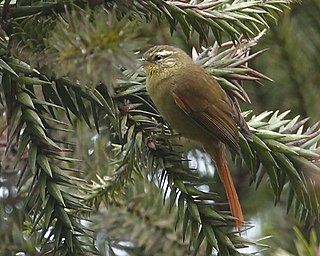
The olive spinetail is a species of bird in the Furnariinae subfamily of the ovenbird family Furnariidae. It is found in Argentina, Brazil, and Paraguay.

The pallid spinetail is a species of bird in the Furnariinae subfamily of the ovenbird family Furnariidae. It is endemic to Brazil.

The stripe-crowned spinetail is a species of bird in the Furnariinae subfamily of the ovenbird family Furnariidae. It is found in Argentina, Bolivia, Brazil, Paraguay, and Uruguay.
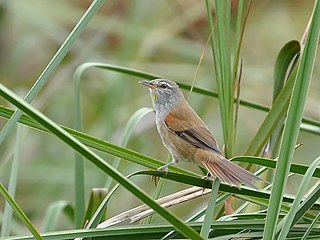
The sulphur-bearded reedhaunter or sulphur-throated spinetail is a species of bird in the Furnariinae subfamily of the ovenbird family Furnariidae. It is found in Argentina, Brazil, and Uruguay.
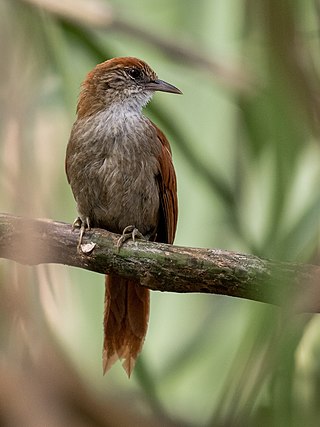
Parker's spinetail is a species of bird in the Furnariinae subfamily of the ovenbird family Furnariidae. It is found in Bolivia, Brazil, Ecuador, and Peru.

The white-browed spinetail is a species of bird in the Furnariinae subfamily of the ovenbird family Furnariidae. It is found in Colombia, Ecuador, Peru, and Venezuela.
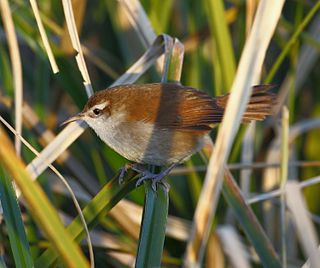
The curve-billed reedhaunter is a species of bird in the Furnariinae subfamily of the ovenbird family Furnariidae. It is found in Argentina, Brazil, and Uruguay.

The Itatiaia spinetail, also known as the Itatiaia thistletail, is a species of bird in the Furnariinae subfamily of the ovenbird family Furnariidae. It is endemic to southeastern Brazil.

The spectacled prickletail is a species of bird in the Furnariinae subfamily of the ovenbird family Furnariidae. It is found in Colombia, Ecuador, and Peru.

The great spinetail is a Near Threatened species of bird in the Furnariinae subfamily of the ovenbird family Furnariidae. It is endemic to Peru.
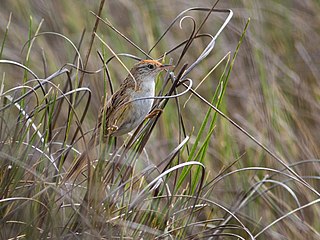
The bay-capped wren-spinetail is a species of bird in the Furnariinae subfamily of the ovenbird family Furnariidae. It is found in Argentina, Brazil, Paraguay, and Uruguay.

The black-throated spinetail is a species of bird in the Furnariinae subfamily of the ovenbird family Furnariidae. It is endemic to Venezuela.
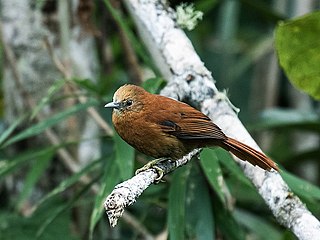
The russet-mantled softtail is a Near Threatened species of bird in the Furnariinae subfamily of the ovenbird family Furnariidae. It is endemic to northern Peru.
Poecilurus is an obsolete genus of birds formerly classified in the Furnariidae (ovenbird) family from South America. It contained three species:


















